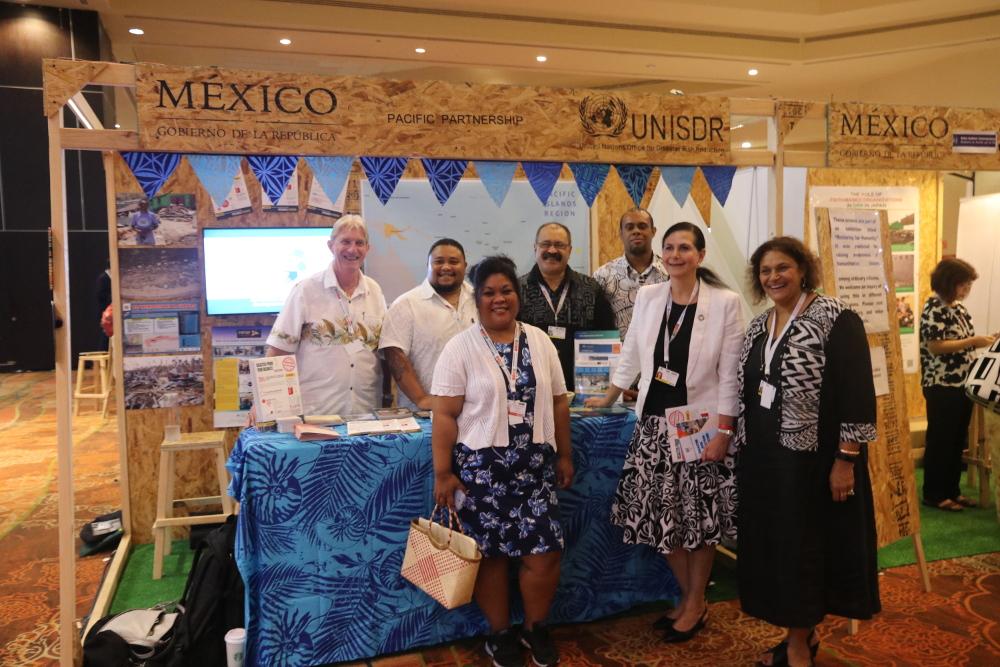Pacific leaders today called for action to stem the tide of emissions and prevent Pacific Island countries from being devastated by disasters and climate change.
President of the Republic of Kiribati H.E. Tenati Maamau whilst speaking at a Pacific Disaster Resilience event at the Global Platform in Disaster Risk Reduction (Cancun, Mexico) said now is the time to act before it’s too late.
“It is distressing and heartbreaking to see our people continuing to fight the onslaught of sea level rise, storm surges, floods, droughts and disasters like Cyclone Pam and Cyclone Winston on their lives, homes, farmland, livelihood, cultural heritage and critical source of water.
“Climate change continues to be the greatest challenge of our time. It continues to be a roadblock in our pathway towards the realization of our vision and achievement of the Sustainable Development Goals.
“We cannot talk about disaster risk reduction without talking about climate change. We will continue to demand concrete action to curb emissions and urgent adaptation assistance for our people, who are paying the ultimate price,” He said.
The country of Kiribati is one of the most vulnerable in the world to disaster risk and has been predicted as one of the first island nations to be consumed by rising sea levels caused by climate change. The two most vulnerable countries in the world are within the same region namely Vanuatu and Tonga, according to the World Risk Report 2016, whilst all Pacific Island nations are highly vulnerable to the impacts of climate change and disasters.
President Maamau said accessing funding support can be time consuming and arduous for small Pacific Island nations and he is calling on donors, implementing agencies, global governments and people to help Pacific countries access support to reduce the impact of disasters and mitigate the already overwhelming effects of climate change.
“This is our duty and our moral obligation so for the sake of our children and children’s children, let us do what is right for them so they can live in a secure world where they can lead free, healthy and productive lives. Let’s us make sure they are not left behind.”
This comes as the country of Fiji still recovers from Tropical Cyclone Winston that devastated the island nation in February 2016. Cyclone Winston was the largest recorded cyclone in the Southern Hemisphere on record and left a damage bill of US 1.4bn equivalent to 10 per cent of the country’s GDP.
Fiji Permanent Secretary for Ministry of Rural and Maritime Development and National Disaster Management, Mr Meleti Bainimarama said the country has never faced a disaster as devastating and action is needed to protect the lives and livelihoods of Pacific islanders to future severe weather.
“It was a learning process from the government. It made us realise we had gaps in the way we did recovery and rehabilitation and we thank the partnership with the Pacific Community (SPC) and the Pacific Islands Forum Secretariat and other organisations that came in because we knew after Winston the enormity of this cyclone we had gaps and we had to look to other organisations to support. This is something we are building and we know we need to step up on building back better,” he said.
These sentiments and vulnerability were also highlighted by the fact that the Republic of Marshall Islands in the North Pacific lived through one of its worst droughts in history across 2015-2016 and of which have been again declared in drought conditions in recent months.
Deputy President of Republic of Marshall Islands, Hon. Mattlan Zackhras spoke strongly at the event on the risks being faced by the Marshallese people and the real progress the Marshall Islands are making towards risk resilience.
“The majority of our population rely almost exclusively on rainwater harvested through household catchments and storage systems for drinking and cooking and basic hygiene.
“In fact it’s one of the longest droughts we’ve seen in the history of our Republic. It poses a serious challenge for our people especially our disaster teams on the ground working with our outer island communities,” he said.
The country undertook an atoll wide Post Disaster Needs Assessment after the alleviation of drought in 2016 which was the first of its kind in the Northern Pacific region and provided detailed and cross cutting data.
These island countries are embedded throughout the Pacific Ocean with both great beauty and significant risk. The region has small economies and significant barriers to access due to the vast ocean scape that envelopes the island nations. This region is on the forefront of climate change and disaster risk and Pacific Leaders are calling on all global actors to step up and protect their region from sinking or being wiped off the map.
The Pacific Side Event at the 2017 Global Platform for Disaster Risk Reduction in Mexico was coordinated on behalf of the Pacific Delegation by the Pacific Community (SPC) and the United Nations Office for Disaster Risk Reduction Pacific with support from the Pacific Island Forum Secretariat (PIFS) and the University of the South Pacific (USP).
Media contact:
Lisa Kingbserry, Pacific Community [email protected]
Timothy Wilcox, UNISDR [email protected]
